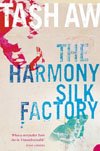 The story is about the life of the infamous Chinaman named Johnny Lim, a textile merchant, as well as the owner of the Harmony Silk Factory, which serves as a front for his illegal businesses. The novel also deals with his marriage to the stunning Snow Soong, his involvement with the communists, and his friendship with Peter Wormwood, a wandering Englishman.
The story is about the life of the infamous Chinaman named Johnny Lim, a textile merchant, as well as the owner of the Harmony Silk Factory, which serves as a front for his illegal businesses. The novel also deals with his marriage to the stunning Snow Soong, his involvement with the communists, and his friendship with Peter Wormwood, a wandering Englishman.The story is set during the era of British colonialism in Malaya, where many 'Malayans' (not yet called Malaysians) tend to "adopt the unfeasible names of matinee idols and end up with names such as Rudolph Chen, Rock Hudson Ho, Mongomery Hashim, Valentino Wong, Cary Gopal and too many Jameses to mention" as the writer puts it. By now, you can tell that the writer has a sharp eye for satire and a great sense of humour.
The story is devided into three parts, starting off Jasper, Johnny Lim's son, tracing his father's life: "Now is a good time to tell his story. At long last, I have put my crime-funded education to good use".
Jasper reveals that Johnny Lim, a communist himself, was the man who plotted the massacre of 15 leaders of Malayan Communist Party, 44 men in total. On Sept 1, 1942, Johnny Lim turned his back against his own people by rounding up the 29 of the most important communists in a limestone cave in Kinta valley and having them bayoneted one at a time by the Japanese Soldiers. Johnny Lim turned out to be the sole survivor. At that point, you can feel the heart-rending frustration and anger of Jasper as he describes the incident.
Speaking from a Malaysian's point of view, this book is not entirely fictional as it is claimed to be. In fact, it is almost controversial because it uncovers the cautionary tales about the communists struggle against British imperialism and the Japanese. These were monumental incidents in the country's evolution, which has been completely singled out from history text book back in Malaysia.
Despite the intensity of the story, this novel is well waxed and polished with poetical prose. Its words frequently seep into your heart to take a siesta. "She died on the day I was born, her body exhausted by the effort of giving me life." Many times, I had to re-read sentences such as this to feel the grace.
The second part is a series of dairy entries written by Snow Soong about her honeymoon trip to the mysterious Seven Maiden Islands, bizarrely accompanied by a Japanese professor named Kunichika Mamoru and Peter Wormwood.
Along the journey, she contemplates breaking up with Johnny and to seek the right time to tell him that. At the same time, she seeks emotional comfort and a sense of intimacy from Kunichika.
"Women are not often on their own: they are constantly surrounded by men-fathers, husbands, sons. Those are the people we live for, whose lives press into ours at every moment. We obey, nurse, nurture and love. But in the end, we always have been alone.” This is the voice of Snow, but it can easily represent the inner voice of every woman. They set off on a boat, which break down and eventually wracked by a storm.
The last part is the account of Peter Wormwood. It answers the questions why he embarked on a journey to Malaya and he crossed path with Johnny, who became his best friend, not to mention his secret longing and love for Snow, his best friend's wife. He also recalls the journey to Seven Maiden Island and how things unfolded through his eyes.
Judging by the depth of the story and its literary value, it is not difficult to see why it was nominated for the Booker Prize in 2005 (but lost to John Banville's The Sea). Somehow, The Harmony Silk Factory went on to become the winner of 2006 Whitbread Book of the Year award. Well done, Tash Aw.


